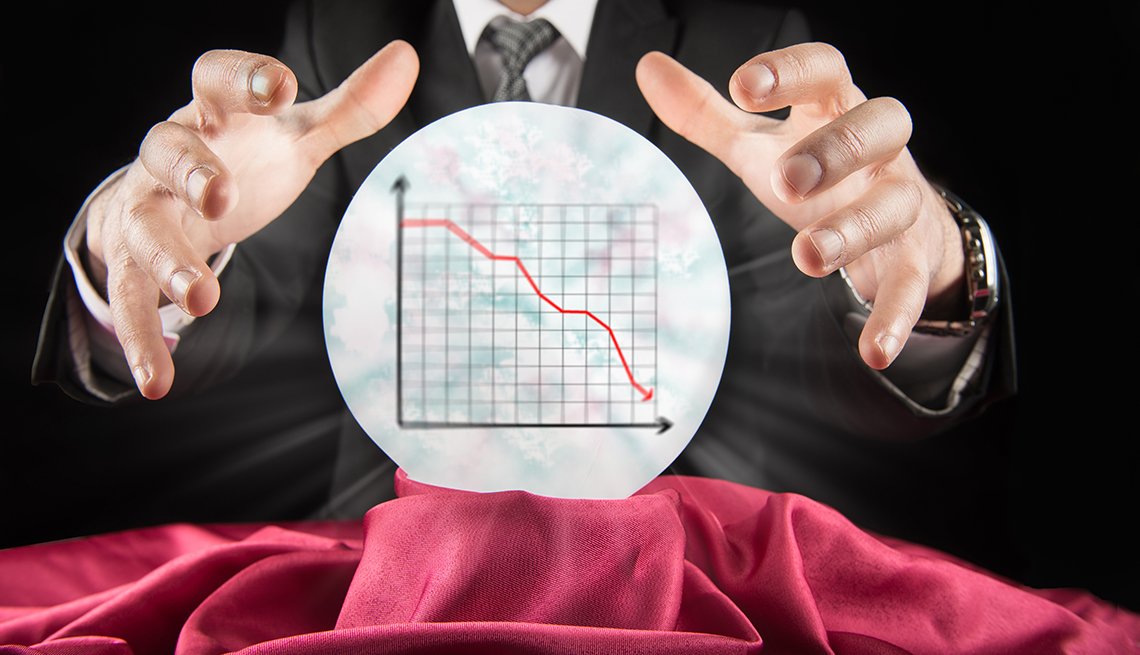
How accurate are stock market predictions?
- Select a language for the TTS:
- UK English Female
- UK English Male
- US English Female
- US English Male
- Australian Female
- Australian Male
- Language selected: (auto detect) - EN
Play all audios:

Have you seen financial forecasts like the following recently? _"The U.S. stock market is in a super bubble..."_ _"Sell, sell, sell these two stocks immediately..."_
_"...Interest rates will definitely crush bond prices..."_ _"Gold will surge..."_ _"Bitcoin will surpass $200,000..."_ Now before you bet your financial future
on any forecast, consider how differently your TV meteorologist forecasts the weather. iStock / Getty Images _Temperatures will drop dramatically tomorrow as a cold front passes through. The
high is forecast to be about 32 degrees, with a 70 percent chance of snow. Expect 1 to 3 inches but if the center of the low-pressure system passes further south, then we might only get
flurries._ People who make financial forecasts tend to sound extremely confident. But meteorologists tend to sound uncertain, even wishy-washy, about their own forecasts. Any idea why?
Financial forecasters come across far more confidently for two reasons. First, note that they don’t give a time frame. Sure, gold will surge sometime. And Bitcoin could plunge this year but
may some day hit $200,000. You can never prove any of these forecasts as long as they follow the golden rule of financial forecasting — give dates or give numbers but never give both. The
second reason these financial forecasters may sound confident is they could be trying to sell you something. As human beings, we are more likely to be persuaded by confident people. But be
wary of prophets looking to profit from you. WHAT YOUR TV METEOROLOGIST CAN TELL YOU The meteorologist, on the other hand, is forecasting the weather for tomorrow. If it turns out that the
next day’s is the storm of the century rather than a small snow event, viewers will long remember the erroneous forecast that stranded them on the freeway or at the airport or in the office
for days. That’s why the meteorologists give a probabilistic forecast and often talk about what could happen to make the forecast dead wrong. Predicting financial markets is far more
uncertain than predicting the weather. In fact, it’s awfully hard to even explain past market performance. The U.S. stock market, as measured by the broadest Wilshire 5000 index, gained over
53 percent during the two years ended Dec. 31, 2021, including dividends. If we look at the major events over 2020 and 2021, we had a pandemic that didn’t seem to end, rising unemployment,
huge deficit spending, a surging political divide, inflation not seen for the past 40 years, and China and Russia causing extreme uncertainty. Yet markets thrived, making fools of us all,
and the message is that if we can’t even explain the past, we should be humble and uncertain in predicting the future of financial markets. Here is an example of a forecast from Vanguard I
happen to think is much better. Over the next decade, Vanguard is predicting, U.S. stocks will average only a 3.3 percent annualized gain. What’s different about this forecast is they put
probabilities around that expected return, with there being a 5 percent chance stocks could earn 10 percent annually or better and a 5 percent chance stocks could lose 3.4 percent annually
or worse. Not only are the ranges quite large, there is a 10 percent chance that the actual results may be outside even these large ranges. The paper discusses the risks in these forecasts
at length. While this forecast isn’t as appealing as those precise and confident forecasts made by various financial gurus, it’s far more useful. One must understand both the upside of great
returns and the consequences of the downside of losses over the longer run.
